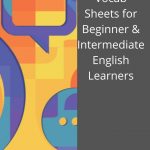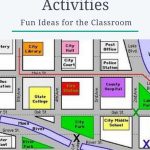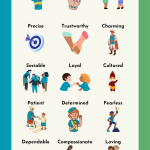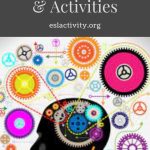If you’re looking to learn English for academic purposes, then you’re in the right place! You’ll want to check out this book, filled with real-world academic English that you can use inside and outside the classroom at English-speaking colleges and universities. Keep on reading to see a sample from the book and to find out where to buy it.
English for Academic Purposes: An Introduction
- Amazon Kindle Edition
- Bolen, Jackie (Author)
- English (Publication Language)
- 84 Pages - 02/08/2022 (Publication Date)
Academic English is quite different from conversational English that you may have learned in school. There are specific phrases, words, idioms, and expressions you need to know. Get ready to study at an English-speaking college or university in a place like the USA, Canada, England or Australia.
The best part is that this book will help prepare you for conversations both inside and outside the classroom. Check out a sample chapter from Real World English for Academic Situations Inside and Outside the Classroom below.

Real world academic English book
Check out a Sample from Real World Academic English
The Lab Report
A professor is talking to her students about a lab report that they have to do.
I want to talk a little bit about your upcoming lab report. Remember that it’s due next Thursday at the beginning of class. I won’t accept late assignments.
The most important thing is to analyze the reactions of the compound at different temperatures. Once you get some results, please validate them somehow. How you do this is up to you but you’ll have to explain why you chose that in your lab report. Remember that technique is very important here if you want to replicate your results so pay close attention.
In your report, be sure to cite your references clearly in the footnotes. I expect you to use at least three sources. Your TA will be available between now and next Thursday if you have any questions.
Vocabulary
lab report: A paper written that talks about results from an experiment.
due: Expected at a certain time.
analyze: Examine something closely.
results: Outcome of something.
validate: Confirm research testing is correct; test research results in order to show work is accurate.
technique: How to do something.
replicate: Do something using the exact same process to get the same results.
cite your references: Say where you’re getting information from.
footnotes: At the bottom of the page in a lab report, thesis or paper. Contains extra information.
TA: Teaching assistant (usually a graduate student) who helps a professor teach students.
Vocabulary Challenge
- Can I see your _____? I got such a bad grade on mine but I’m not sure what went wrong.
- I can’t seem to _____ my initial findings. Can you help me figure out what’s happening?
- Okay, now you should _____ your findings. Do the experiment one more time and make sure you find the same thing.
- When is the report _____?
- Be sure to _____ in the _____. You can get in big trouble if you don’t.
- Can you _____ this data and then write a report for me, please?
- She has excellent _____ for adjusting slides under the microscope. Please watch her.
- I’m going to be a _____ for Professor Bolen next year.
- The _____ don’t seem right. I expected the opposite to happen. Let’s do the experiment again.
Answers
- lab report
- replicate
- validate
- due
- cite your references, footnotes
- analyze
- technique
- TA
- results
Pick up your copy of Real World English for Academic Situations Inside and Outside the Classroom
- Amazon Kindle Edition
- Bolen, Jackie (Author)
- English (Publication Language)
- 84 Pages - 02/08/2022 (Publication Date)
Do you like what you see and want to learn some more academic English? Then you’ll want to consider buying the book. You can get it in both print and digital formats.
Pick up your copy of the book today and get ready for some English for academic purposes awesome tomorrow:
English for Academic Purposes FAQs
There are a number of common questions that people have about this topic. Here are the answers to some of the most popular ones.
What is English for Academic Purposes?
English for academic purposes (also known as EAP) is a course or program that prepares ESL/EFL students to study at an English-speaking college or university.
What is the difference between English for academic purposes and general English?
The difference between English for academic purposes (EAP) and general English is the intent. EAP aims to prepare students for post-secondary study in English-speaking universities. General English aims to teach students basic skills to communicate in real-life situations in English.
What is the example of Academic English?
Some examples of academic English vocabulary are as follows: thesis, TA, dissertation, footnotes, referencing, citation, analyze, compare and contrast.
What is English for specific purposes?
English for specific purposes (ESP) is a learner-centered approach that aims to equip students with the specific English tools they need for a discipline such as aviation, nursing, accounting, business, law engineering, etc.
What are some Tips for Learning English for Academic Purposes?
Learning English for academic purposes requires specific strategies and approaches to succeed in academic settings. Here are some tips to help you learn English for academic purposes effectively:
Set Clear Goals
Define your specific academic English goals. Identify the skills you need to improve, such as reading academic texts, writing research papers, or giving presentations. Having clear goals will help you focus your efforts and measure your progress.
Build Vocabulary
Academic English relies on a wide range of vocabulary. Expand your academic vocabulary by reading academic texts, using vocabulary resources, and creating word lists specific to your field of study. Regularly review and practice using new words in context.
Improve Reading Skills
Academic reading can be challenging. Practice skimming and scanning techniques to quickly find relevant information. Pay attention to academic text structures and key academic language features, such as connecting ideas, using academic register, and recognizing rhetorical patterns.
Enhance Listening Skills
Develop your listening skills by engaging with academic lectures, podcasts, and presentations. Take notes while listening to capture key points and important details. Practice listening for specific information, such as main ideas, supporting details, and academic vocabulary.
Develop Writing Skills
Academic writing requires precision and clarity. Familiarize yourself with academic writing conventions, such as formal language, proper referencing, and structuring academic essays or research papers. Seek feedback from teachers or peers to improve your writing.
Practice Speaking and Presenting
Engage in academic discussions, group work, and presentations to improve your speaking skills. Participate in academic seminars or language exchange programs to gain confidence in expressing ideas, defending arguments, and asking questions.
Seek Language Support
Take advantage of language support services available in your academic institution, such as writing centers or language labs. Attend language workshops or courses specifically designed for academic English. Utilize online resources and language-learning platforms to supplement your learning.
Engage with Authentic Materials
Engage with authentic academic materials, such as research articles, journals, and textbooks related to your field of study. Analyze the language used, identify key concepts, and practice summarizing and synthesizing information.
Practice Time Management
Academic English learning requires dedicated time and effort. Set aside regular study periods, create a study schedule, and allocate time for reading, writing, listening, and speaking practice. Prioritize tasks and be disciplined in your study habits.
Engage in Language Exchange
Connect with native English speakers or other learners who are also studying English for academic purposes. Engage in language exchange activities to practice conversational English, receive feedback, and gain cultural insights.
English for Academic Purposes: Join the Conversation
Do you have any tips or tricks for learning academic English? Or, any questions? Leave a comment below and let us know what you think about it. We’d love to hear from you.
Last update on 2022-07-17 / Affiliate links / Images from Amazon Product Advertising API







